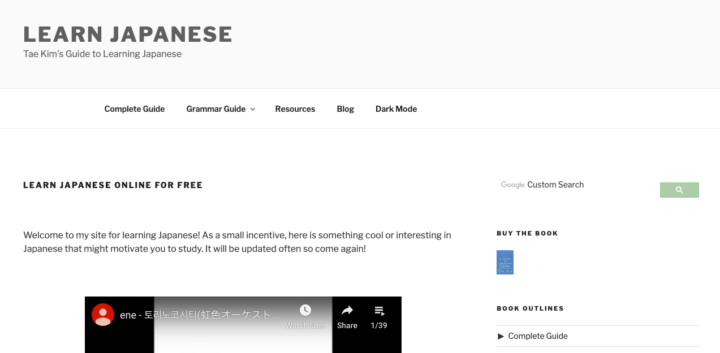Are you ready to improve your Japanese? Maybe you’ve come to Japan and realized that you need Japanese to interact with others smoothly (and the subtitles you’ve depended on when watching Japanese dramas and anime don’t exist in real life). Maybe you want to become a master of the Japanese language. Or maybe you’ve simply decided to dabble in Japanese as a hobby. No matter what your motivation is, you’ll need to know the best websites for learning Japanese.
We’ll be introducing some websites that we think are convenient and prove to be an effective way to start your self-learning Japanese journey. Now, hold on tight and read through some of our recommendations for the best websites to use in studying Japanese!
First things first, let’s answer the big floating question: is learning Japanese hard?
Perhaps, there’s really no right answer to it. Many factors can help in one’s learning. Age can be one. If you started learning a second language at a younger age, picking up the language might not be terribly difficult. It also depends on the way you learn and the environment you are in. If you’re fairly exposed to the language, you can have infinite opportunities to practice.
Japanese can be a challenge to many for a lot of reasons. There are quite a few Japanese words that doesn’t even have direct English translations. There are also many layers or forms of the language, ranging from casual to business. You might even have to tune your wordings depending on the person you’re talking to, deciding on how much keigo (honorifics) you should use. Keigo refers to the part of speech that expresses respect, especially in social situations. Keigo itself has many structures and is a standalone field in the study of Japanese language.
Compared to other languages, Japanese also uses multiple alphabets. Which are; Romaji (romanization of the Japanese), hiragana (basic phonetic script), katana (mainly used for words imported from foreign languages), and kanji (adopted Chinese characters). Also, Japanese grammar is different from English, as the order of it’s sentences goes by subject-object-verb, which can be really tricky for some.
Another challenge is that Japanese is actually the fastest spoken language in the world!
But here’s some good news: You’re not actually starting from scratch when learning Japanese. In fact, you already know some Japanese words such as sushi, typhoon, ninja, and karate. There are also tons of foreign loan words (also called gairaigo) that exist in Japanese. In fact, the happy birthday song in Japanese is very similar to its English counterpart. So, you aren’t a total newbie at all! This is a good stepping stone.
Adding on to that, compared to its East Asian neighbors, Japanese isn’t a tonal language. Mandarin has 4 tones, Thai 5 tones while Cantonese has 9 tones! Of course, there are right intonations in the language but this means that even if you pronounce a word in a different tone, it’s meaning wouldn’t change.
And comparing it to the far west where some languages are gendered like French and Spanish, Japanese is not. Although there are certain words that are used by certain genders (e.g. I = ore (hard masculine), atashi (feminine).
That said, Japanese can definitely be learned without the need to take formal classes — self-taught Japanese is just as effective given the right amount of resources, practice, and patience. Here are some websites you can definitely check out!
Best Websites for Learning Japanese
Tsunagaru Hirogaru Nihongo deno Kurashi

Credit: Tsunagaru Hirogaru Nihongo deno Kurashi
Tsunagaru Hirogaru Nihongo deno Kurashi
「つながるひろがるにほんごでのくらし(Tsunagaru Hirogaru Nihongo deno Kurashi)」is a website operated by the Japanese Language Division of the Agency for Cultural Affairs and aims to help foreigners living in Japan learn Japanese. If you live in Japan but haven’t had the opportunity to learn Japanese, or if you are a Japanese language beginner, then this site is for you.
It’s free and registration is not required, it’s easy to get started.
Because it’s been created especially with the everyday situations non-Japanese residents experience living in Japan it’s super useful. The site uses videos so you can learn the words in the correct context and understand the situation. Also, there are various language levels, check your own and choose scenes accordingly for a more effective learning system!
JapanesePod101
Also available on YouTube, JapanesePod101 offers hundreds and thousands of podcasts and videos to listen to — mostly dedicated to improving your speaking and listening skills. What’s great about this site is that the lessons are divided into categories from absolute beginner right up to advanced level. Even if you just want to learn some survival Japanese before your next trip to the land of the rising sun, you got it here too. They offer a 7-day free trial but have a free podcast on iTunes.
Italki
Itaki is one of the most famous sites for language learners. It will connect you to international students and language teachers — and it’s not limited to Japanese. You can practice speaking online or just ask questions. For free, you will be paired with a Japanese student learning English. Your partner will teach you Japanese and you will in turn, teach him/her, English. If you want something more extensive, you can sign up for a private lesson with a tutor or a teacher over Skype. Of course, this incurs a fee but the good thing is that you can choose which service to apply for depending on your budget.
Lang-8
If you’re looking to polish or practice your writing skills, look no further than Lang-8. Here, you can post in Japanese and a native speaker will then check your work — correct it or improve it if needed. In a nutshell, it’s like a collaborative way to learn Japanese. You can write blog posts, essays, diary entries or simply ask questions. Plus, you can get feedback straight from a native speaker!
JGram
As an open-source database, this site is run by a community of dedicated Japanese learners. You can write your own explanations after registering. What’s impressive is that it has a really great list of grammar rules, complete with explanations and examples — truly what you need when self-learning Japanese. Because it’s run by contributors, the site also covers different levels extensively, from beginner level to advanced level. Bonus treat: sign up to their mailing list so you can receive a daily grammar tip!
Tae Kim’s Japanese Grammar Guide
Tae Kim’s Japanese Grammar Guide
Don’t let the simplicity of this site fool you. It has a definitive guide to Japanese grammar with comprehensive explanations and precise examples. The guide is also available in 11 whooping languages! What sets this site apart is its blog and forum, where you can communicate with other Japanese language learners, ready to answer your most pressing questions. After all, the joy in learning a language is doubled by having people around you that are helpful and supportive. Bonus: You can buy Tae Kim’s book too!
NHK World
Yes, that’s right. Aside from being an English TV and radio station, NHK World also offers a Japanese learning program. Besides the free materials that covers handy PDF files to audio files, they also have a manga audiobook — which can be very helpful for manga lovers who are trying to learn Japanese. You will follow Anna, an international student from Thailand as she, herself learns Japanese. You can also probably tackle lessons and quizzes in the language you are most comfortable in, as they come in different 17 languages.
Genki
For absolute beginners, this site is for you. Some of you might have heard of Genki, as it’s one of the most famous textbook used/recommended to learn Japanese. The material for this site is taken from Genki and helps you practice particles and grammars. There are multiple-choice quizzes that have accompanying explanations later on. This and the actual Genki textbook make for a great combination.
Keigo – Advice
Earlier in this article, I talked about keigo for a bit. While learning keigo is usually reserved for those on amore advanced level, it doesn’t hurt to try your hand at it. Keigo or honorifics are forms of speech used to show respect. Honorifics show the difference (or similarities) in terms of social hierarchy and status. It is a very comprehensive system that even Japanese native speakers take time to learn. This site is created by the Japanese Ministry of Culture both for native speakers and advanced Japanese language learners. It offers a detailed guide to keigo, with explanations and quizzes. There are also videos meant to show real-life situations.
Your Favourite Websites For Learning Japanese
Have you tried any of these websites? Will you consider checking them out?
Now, go forth and good luck with your Japanese studies!














